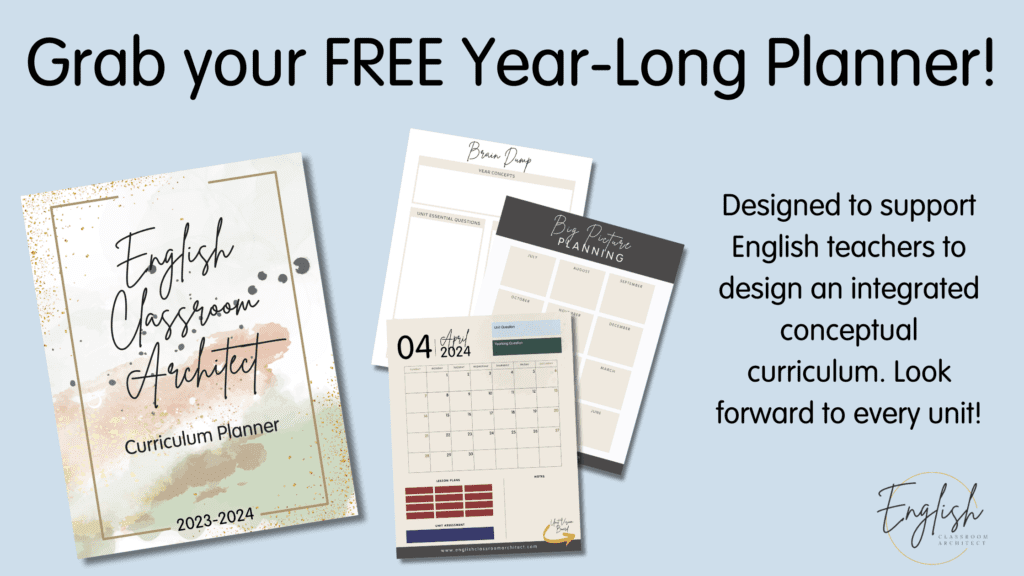

Table of Contents
Introduction
Is it possible to only work during contract hours as a high school English teacher? I think it is. In this episode I give you three strategies to shift your mindset around the year with the goal of getting down to working just contract hours. Let’s explore in today’s episode.
The first strategy we will be exploring is planning for energy. Channel the Pomodoro method, where you work intensely for a set amount of time and then take short breaks. By planning your curriculum to incorporate focused bursts, you can maintain productivity while also allowing for essential breaks to recharge. This method can help you stay on track and avoid feeling overwhelmed.
The second key point we will be covering is planning for grading life. It’s important to change the mindset about working outside of contract hours. One way to do this is by prioritizing formative assignments that can be graded more quickly. By giving students timely and targeted feedback during the unit, you can help them improve their skills and achieve objectives without spending excessive time on lengthy assessments. I’ve suggested reserving more time for formative assessments and minimizing the grading time required for summative assessments.
Lastly, we encourage you to plan for your own life. It is crucial to prioritize self-care and avoid neglecting your well-being, as it can have negative consequences for both yourself and those around you. Consider planning vacations, holidays, and times when you or your family may fall ill. By allowing for flexibility and adjusting your workload during low-energy periods, such as winter, you can prevent mental and physical strain.
Throughout this episode, I will share personal experiences and insights to support these strategies. The aim is to help you create breathing room in your curriculum, nurture creativity and imagination in students, and ultimately achieve a more fulfilling work-life balance.
Key Topics Discussed for Working Within Contract Hours in This Episode
Effective Planning for Managing Workload:
- Importance of planning for grading workload
- Assigning and grading assignments based on genuine interest
- Creating engaging and interesting writing prompts
- Utilizing backwards planning for meaningful assignments
- Providing stimulating content for thoughtful responses
Breaking Up Assessments for Manageability:
- Breaking up assessments into smaller and major assessments
- Sprint-like approach for a manageable workload
- Shorter timeframes for assessments
Planning for Energy and Incorporating Breaks:
- Importance of incorporating breaks and pauses
- Introduction to the Pomodoro method
- Planning breaks for energy management
Changing the Mindset about Working Outside Contract Hours:
- Personal experience of working within contract hours
- Benefits of work-life balance and mental health
- Encouraging a shift in mindset
Feedback and Grading Strategies:
- Providing feedback for skill improvement and objectives achievement
- Grading process considerations when designing assignments
- Time limitations for each unit and avoiding student and teacher fatigue
- Shorter, less rigorous units after longer, intense units
Planning for Your Life:
- Importance of planning vacations, holidays, and sick days
- Considering energy levels and adjusting workload accordingly
- Prioritizing self-care to avoid mental and physical strain
Creating Variety and Flexibility in Student Assignments:
- Encouraging investigation and expression of student interests
- Moving away from formulaic writing
- Nurturing creativity and imagination in students
Creating Breathing Room in the Curriculum:
- Importance of having breathing room in the curriculum
- Channeling the Pomodoro method for energy planning
- Strategizing grading time for different assignment types
- Prioritizing formative assignments and feedback
- Quick grading of summative assessments after formative feedback
Opportunities for Discussion About Working Within Contract Hours Based on This Episode

Resources You May Be Interested In
- Free planner…this is really more than a planner. It’s a hyperlinked system to organize units, plan lessons and reflect for future years.
- Curriculum Planning Series: Introduction To a Successful Integrated Curriculum (Part 1 of 3)
- Curriculum Planning Series: Three Step Framing Process for Integrated Content (Part 2 of 3)

More About Anti-Burnout for English Teachers
Are you wanting a classroom strategy that keeps you energized and joyful but want tools and resources to make teaching high school English more manageable? It’s possible, and I’ll share what I’ve learned through my years of trial and error. Let’s build a better classroom!
